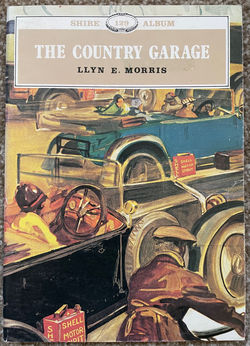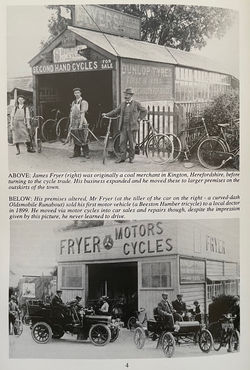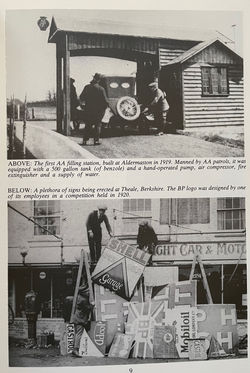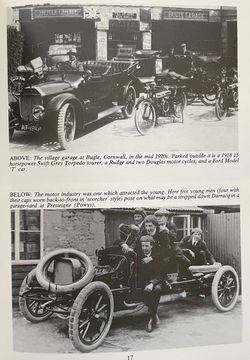COUNTRY
GARAGES IN THE UK – THE EARLY DAYS OF THE AUTOMOBILE IN THE UNITED KINGDOM
SHIRE ALBUM #129 SOFTBOUND BOOK
in ENGLISH by LLYN E. MORRIS
ORIGINS AND GROWTH
EARLY GARAGE OWNERS
THE WORK OF THE COUNTRY GARAGE
THE VARIETY OF REWARDS
-----------------------------------
Additional Information from Internet
Encyclopedia
Motorcars came into use on
British roads during the early 1890s, but initially relied entirely on imported
vehicles. The inception of the British motor industry can be traced back to the
late 1880s, when Frederick Simms, a London-based consulting engineer, became
friends with Gottlieb Daimler, who had, in 1885, patented a successful design
for a high-speed petrol engine. Simms acquired the British rights to Daimler's
engine and associated patents and from 1891 successfully sold launches using
these Cannstatt-made motors from Eel Pie Island in the Thames. In 1893 he
formed The Daimler Motor Syndicate Limited for his various Daimler-related
enterprises.
In June 1895, Simms and his
friend Evelyn Ellis promoted motor cars in the United Kingdom by bringing a
Daimler-engined Panhard & Levassor to England and in July it completed,
without police intervention, the first British long-distance motorcar journey from
Southampton to Malvern.
Simms' documented plans to
manufacture Daimler motors and Daimler Motor Carriages (in Cheltenham) were
taken over, together with his company and its Daimler licences, by London
company-promoter H J Lawson. Lawson contracted to buy The Daimler Motor
Syndicate Limited and all its rights and on 14 January 1896 formed and in
February successfully floated in London The Daimler Motor Company Limited. It
then purchased from a friend of Lawson a disused cotton mill in Coventry for car
engine and chassis manufacture where, it is claimed, the UK's first serial
production car was made.
The claim for the first
all-British motor car is contested, but George Lanchester's first cars of 1895
and 1896 did include French and German components. In 1891 Richard Stephens, a
mining engineer from South Wales, returned from a commission in Michigan to
establish a bicycle works in Clevedon, Somerset. Whilst in the United States,
he had seen the developments in motive power and by 1897 he had produced his
first car. This was entirely of his own design and manufacture, including the
two-cylinder engine, apart from the wheels which he bought from Starley in
Coventry. This was probably the first all-British car and Stephens set up a
production line, manufacturing in all, twelve vehicles, including four- and
six-seater cars and hackneys, and nine-seater buses.
Early motor vehicle development
in the UK had been effectively stopped by a series of Locomotive Acts
introduced during the 19th century which severely restricted the use of
mechanically propelled vehicles on the public highways. Following intense
advocacy by motor vehicle enthusiasts, including Harry J. Lawson of Daimler,
the worst restrictions of these acts, (the need for each vehicle to be
accompanied by a crew of three, and a 2 mph (3.2 km/h) speed limit in towns),
was lifted by the Locomotives on Highways Act 1896.[13] Under this regulation,
light locomotives (those vehicles under 3 tons unladen weight) were exempt from
the previous restrictions, and a higher speed limit – 14 mph (23 km/h) was set
for them. To celebrate the new freedoms Lawson organised the Emancipation Run
held on 14 November 1896, the day the new Act came into force. This occasion
has been commemorated since 1927 by the annual London to Brighton Veteran Car
Run.
The Rolls-Royce 10 hp, which was
the first car to be produced as a result of the agreement between Charles Rolls
and Henry Royce.
The early British vehicles of
the late-nineteenth century relied mainly upon developments from Germany and
France. By 1900 however, the first all-British 4-wheel car had been designed
and built by Herbert Austin as manager of The Wolseley Sheep Shearing Machine
Company. In 1901, backed by (Vickers Limited) brothers 'Colonel Tom' and Albert
Vickers, Austin started what became Wolseley Motors in Birmingham and was the
UK's largest car manufacturer until Ford overtook them in 1913.
The great bulk of the pioneering
car producers, many of them from the bicycle industry, got off to a shaky
start. Of the 200 British makes of car that had been launched up until 1913,
only about 100 of the firms were still in existence. In 1910, UK vehicle
production was 14,000 units. By 1913, Henry Ford had built a new factory in
Manchester and was the leading UK carmaker, building 7,310 cars that year,
followed by Wolseley at 3,000, Humber (making cars since 1898 in Coventry) at
2,500, Rover (Coventry car maker since 1904) at 1,800 and Sunbeam (producing
cars since 1901) at 1,700, with the plethora of smaller producers bringing the
1913 total up to about 16,000 vehicles.[16] Car production virtually came to an
end during the war years 1914–1918, although the requirements of war production
led to the development of new mass-production techniques in the motor industry.
By 1922, there were 183 motor
companies in the UK, and by 1929, following the slump years, there were 58
companies remaining.[17] In 1929, production was dominated by Morris (founded
by William Morris in 1910 in Oxford) and Austin (founded by Herbert Austin in
Birmingham in 1905 after he left Wolseley) which between them produced around
60% of total UK output. Singer (Coventry motorcycle manufacturer started
building cars in 1905) followed in third place that year with 15% of
production.
In 1932, the UK overtook France
to become Europe's largest car producer (a position which it retained until
1955). In 1937, the UK produced 379,310 passenger cars and 113,946 commercial
vehicles.[18] To celebrate the granting of his peerage, William Morris upon
becoming Viscount Nuffield, reorganised his motor vehicle companies in 1938,
which by then included not only Morris Motors and MG, but also Wolseley and
Riley (bicycle company founded in Coventry in 1890 and making cars since 1913),
into the Nuffield Organization. In 1939, the top producers were Morris: 27%,
Austin: 24%, Ford: 15%, Standard (founded in Coventry in 1903): 13%, Rootes
(which had acquired Humber and Sunbeam): 11%, Vauxhall (building cars since
1903, acquired by GM in 1925): 10%








